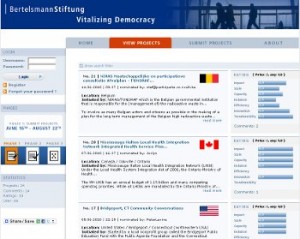 |
28. June 2010 – 12:16 by John Heaven (TuTech Innovation GmbH)
|

Screenshot of vitalizing-democracy.org
As football fans worldwide roar at their televisions, the German Bertelsmann Stiftung is kicking off another prize with arguably more at stake than the World Cup. Has your project found new ways of involving underrepresented citizens? If so, you could be in with a chance of winning the Reinhard Mohn Prize 2011, with prize money of € 150,000!
If you know of a project run by a governmental organisation that deserves to win the Reinhard Mohn Prize 2011, simply visit vitalizing-democracy.org by 22nd August to nominate it. You can also discuss projects that have been submitted so far. By the following phase, which lasts until 6th October 2010, 20 projects will have been selected and you can continue to discuss them on the website. This will be followed by a public consultation before the prize is presented in June 2011 in Gütersloh, Germany. The person who nominates the winning project will be invited to the award ceremony. Read the rest of this entry »
Posted in News, Projects, Uncategorized, good practice, inclusion | No Comments »
 |
30. November 2008 – 12:45 by Francesco Molinari
|
On 17th November the European Commission published the new Work Programme for the ICT theme of the FP7 Specific Programme ‘Cooperation’, defining the priorities for calls for proposals closing in 2009 and 2010 and the criteria that will be used for evaluating the proposals responding to these calls.
A specific objective is entitled “ICT for Governance and Policy Modelling”, aiming to develop governance models, process flows, and analytical tools related to a proper understanding, interpretation, visualisation and harnessing of what we can name “e-Participation 2.0″: the potential of on-line collaborations to trigger and shape significant changes in the functioning of future societies.
Three main outcomes are targeted by this objective:
a) “Governance and Participation Toolbox” (instrument: STREP - Specific Targeted Research Projects)
Advanced tools embodying structural, organisational and new governance models to empower and engage all types of societal groups and communities, enable them to utilise mass cooperation platforms and allow governments to incorporate their input while safeguarding against misuse. These tools will enable the creation, learning, sharing and tracking of group knowledge that cuts across language and cultural interpretation. They should also facilitate transparency and tracking of inputs to the policy making process. The toolbox must include security, identity and access controls to ensure privacy and, where appropriate, the delineation of constituency domains according to the specific needs of government applications.
b) “Policy Modelling, Simulation and Visualisation” (instrument: ditto)
Real-time opinion visualisation and simulation solutions based on modelling, simulation, visualisation and mixed reality technologies, data and opinion mining, filtering and aggregation. This will encompass novel instruments which allow consideration of options based on the simulated behaviour and wishes of individuals, groups or communities (at local, regional and national levels) to understand the possible outcomes of government proposals, decisions and legislation. Tools and techniques will also help to understand, model, simulate and validate the next generation of public services as complex service systems in the environment of social networking and collaborative society, including the needs of the younger generation.
The focus is on advanced tools and technologies to perform societal simulations integrating all possible variables, parameters, interferences, scenarios necessary to forecast potential outcomes and impacts of proposed policy measures. The tools should exploit the vast reserves of Europe’s public sector collective data and knowledge resources which are also developing dynamically. Underlying functions to be integrated include translation, process modelling, data mining, pattern recognition and visualisation as well as other gaming-based simulation, forecasting and back-casting as well as goal-based optimisation techniques. The solutions will also take into account, but not be limited to, state of the art techniques on dynamics
methodology to analyse and model complex systems, cooperative vs. competitive systems, and “cloud” computing applications resources for large scale data analysis.
c) “Roadmapping and Networking for ‘participation, governance and policy modelling’ (instrument: CSA - Coordination or Support Actions)
(i) RTD roadmap to identify emerging technologies and potential applications. It will also consider emerging research directions and will include insight into research activities undertaken in non-EU countries. (SA)
(ii) A dynamic ‘Network’ to encourage networking of relevant stakeholders and teams working in these areas and to encourage multidisciplinary constituency building. (CA)
Indicative funding amounts to EUR 14 million for (a+b) and 1 million for (c). Deadline for proposals submission is 1st April 2009.
Expected impact includes:
- Improved empowerment and engagement of individuals, groups and communities in policy making processes.
- Increased trust of the citizens through transparency and feedback of their contributions.
- More efficient collection of feedback to continuously improve governance.
- Improved prediction of impacts of policy measures, with increased contribution and involvement of individuals and communities, and based on intelligent and optimised use of vast public sector knowledge resources.
- Strengthened competitive position of European industry in the fields of cooperation platforms, optimisation, simulation and visualisation tools.
More info: https://cordis.europa.eu/fp7/dc/index.cfm?fuseaction=UserSite.FP7DetailsCallPage&call_id=185
and https://ec.europa.eu/information_society/activities/egovernment/policy/eparticipation/index_en.htm
Posted in News | 1 Comment »










